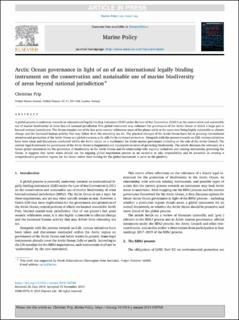Arctic Ocean governance in light of an of an international legally binding instrument on the conservation and sustainable use of marine biodiversity of areas beyond national jurisdiction
Peer reviewed, Journal article
Published version
Permanent lenke
https://hdl.handle.net/11250/2673578Utgivelsesdato
2019Metadata
Vis full innførselSamlinger
Sammendrag
A global process is underway towards an international legally binding instrument (ILBI) under the Law of Sea Convention (LOSC) on the conservation and sustainable use of marine biodiversity of areas beyond national jurisdiction This global instrument may influence the governance of the Arctic Ocean of which a large part is beyond national jurisdiction. The Ocean remains one of the last great oceanic wilderness areas of the planet while at the same time being highly vulnerable to climate change and the increased human activity that may follow from the retreating sea ice. The physical changes of the Arctic Ocean have led to growing international attention and perception of the Arctic Ocean as a global common with calls for its increased protection. Alongside with the process towards an ILBI, various initiatives have been taken and discussions conducted within the Arctic region on a mechanism for Arctic marine governance including on the role of the Arctic Council. The current legal framework for governance of the Arctic Ocean is fragmented and incomplete in terms of protecting biodiversity. The article discusses the relevance of a future global instrument for the protection of biodiversity in the Arctic Ocean and its relationship with regional initiatives and existing instruments governing the Ocean. It suggests that Arctic states should use the ongoing global negotiation process as an incentive to take responsibility and be proactive in creating a comprehensive protection regime for the Ocean rather than waiting for the global instrument to serve as the platform.
